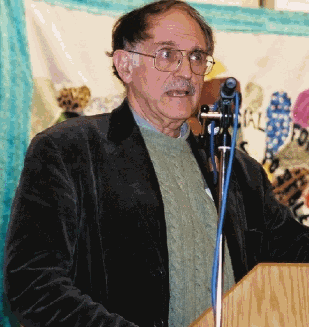Kovel, a USA activist-scholar and one of the most original
sociopolitical thinkers in that country, has written many thoughtful and challenging books on
subjects ranging from Nicaragua to political witch hunting in the USA.

|
|
Joel Kovel
at Small World Social Forum, Victoria, Canada. TW photo.
|
The Enemy of Nature: The End of Capitalism or the End of the World?, not exactly a cheerful title, is an analysis
and action plan to create an ecological socialist society. Although Kovel admits
the obstacles to creating such a society are enormous, he says that we really
have little alternative. Capitalism has alienated and disconnected us from
nature, and as Susan Hawthorne says in Wild Politics, "Disconnection is
critical for a system based on profit." This disconnection is rapidly leading
to major military and social conflict, as well as depletion and fouling of the
earth's ecosystems. To defy and change the world's dominant mindset and dominant
power structure seems a hopeless task.
The author says "capital's power is so uncontested because the conditions for seriously changing
it are far too radical for the great majority of people to contemplate, much less support." (p.50) His analysis of
capitalism is eloquent and convincing, but unlike many he articulates a framework for change and offers us specifics
for committing to activism for change.
His medical background provides the context for the change. Kovel says a physician doesn't brood about how serious
an illness is, but does everything possible to help. In other words, we must do what we can. We have his excellent
diagnosis of capital's strength and power to control humanity and nature; many others have also written about that
dominant paradigm of the world. Now it is time to envision change, envision another possibility, and to envision the
social organization needed to create the change.
Other essays of interest . . .
Ecosocialism is what he names as the "necessary and sufficient transformation of capitalist society for the overcoming of the ecological crisis."
Kovel makes clear that much current thinking and action that responds to the ecological crisis does not consider political or social systems as
part of the problem. The socialism of the last century disregarded the natural world and based its success on a 'growth' model similar to that of capitalism.
But this new way of proceeding connects human society to nature. That is what is so vital and important in this book.
He ends the book with very hopeful and useful ways to connect small actions as an opening to greater awareness. He relates the great inequities
in wealth that underlie today's racism, the immigration and economic refuges who pour out of poverty and conflict, to the power of capital -- stopping
capital will allow poor areas to control their own subsistence and their relationship to nature, instead of being victims of capital's institutions like the World Bank.
Cooperative systems, the seeds of which already exist in many places, give people, particularly women, control over their own lives. Involvement in electoral
politics, especially at the local level, by those wanting ecosocialism helps realize the possibility of change for citizens. We have to work to show in concrete
examples and public dialogue that the possibility for change not only exists, but is already being enacted. Cooperative, eco-sustainable ecosocialism is being
born in many gardens and communities worldwide from the steady disintegration of the WTO to fair trade to the movement for cooperative living to the
acceptance and spread of renewable energy sources.
Then we can see the answer to the question he poses in his final paragraph: "Can there be such a society? Only if we get moving right away. Everything
depends on making the building of ecosocialism proceed in advance of ecological breakdown...There is no time to lose, and a world to win."
I recommend reading this book in conjunction with Wild Politics by Susan Hawthorne and Ecofeminism by Mies and Shiva.
Then...make a commitment to lifelong activism, talk to others, and start changing the world !
© 2008 Theresa Wolfwood

Theresa Wolfwood is Director of the Barnard-Boeker Centre Foundation, in Victoria, British Columbia, Canada
|



